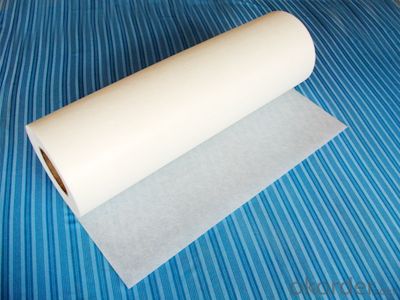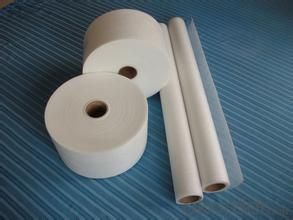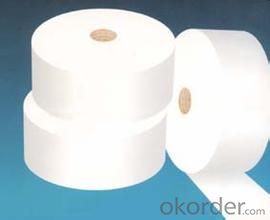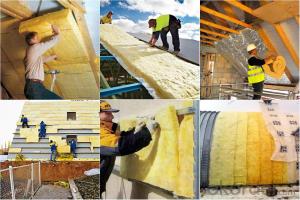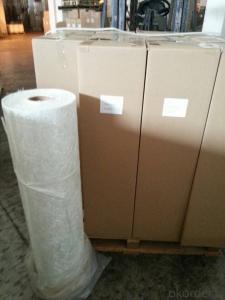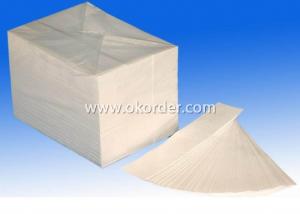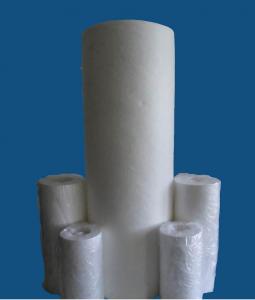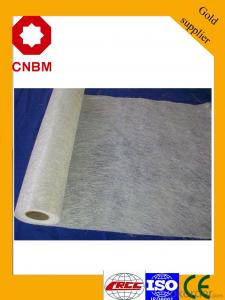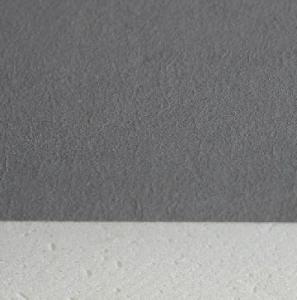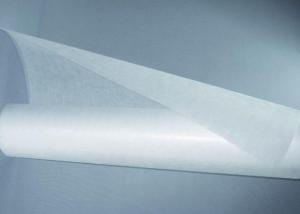Glass Fiber Battery Separator Mat
OKorder Service Pledge
OKorder Financial Service
You Might Also Like
Battery separator fiberglass mat is mainly used lead-acid battery separator substrate, with its separator made of composite with excellent mechanical strength and resistance to vibration performance, strong battery starting capability with the separator assembly, long life.
A smooth surface, uniform thickness
2, suction ability, good acid resistance, moderate stiffness
3, less content and impurity content of potassium permanganate reducing substance
3.Application
Technical parameters:
Product Code | Thickness(mm) | Chlorine content(%) | Iron content(%) | Potassium permanganate restore content(ml/g) |
S-GB-0.3 | 0.3±0.03 | ≤0.003 | ≤0.005 | ≤15 |
S-GB-0.4 | 0.4±0.03 | ≤0.003 | ≤0.005 | ≤15 |
S-GB-0.5 | 0.5±0.04 | ≤0.003 | ≤0.005 | ≤15 |
S-GB-0.6 | 0.6±0.04 | ≤0.003 | ≤0.005 | ≤15 |
S-GB-0.8 | 0.8±0.05 | ≤0.003 | ≤0.005 | ≤15 |
5.FAQ
According to customer requirements, special specifications are also available.
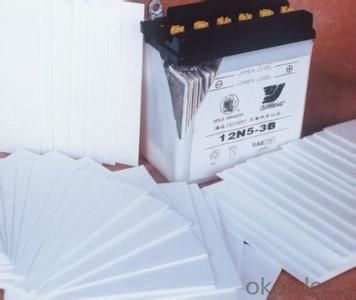
- Q: Is fiberglass mat tissue suitable for underground applications?
- Yes, fiberglass mat tissue is suitable for underground applications. It is commonly used in underground construction projects due to its excellent strength, durability, and resistance to water and corrosion. Additionally, fiberglass mat tissue provides insulation and reinforcement, making it ideal for underground applications such as tunnels, basements, and pipelines.
- Q: Is fiberglass mat tissue suitable for insulation in cold storage facilities?
- Cold storage facilities can benefit from the use of fiberglass mat tissue as an insulation material. Fiberglass possesses remarkable thermal insulation properties, effectively blocking heat transfer and maintaining low temperatures in the storage area. Moreover, fiberglass is moisture-resistant and does not absorb water, making it ideal for environments prone to condensation and moisture. The installation of fiberglass mat tissue is simple and offers a cost-effective solution for insulating the walls, ceilings, and floors of cold storage facilities. Ultimately, the use of fiberglass mat tissue plays a vital role in preserving the desired cold temperatures and preventing any thermal leaks in these facilities.
- Q: What is the cost of fiberglass mat tissue?
- The cost of fiberglass mat tissue can vary depending on various factors such as the brand, quality, quantity, and location. On average, fiberglass mat tissue can range from $0.50 to $2 per square foot. However, it is important to note that prices may differ based on the specific needs of the project and the supplier or retailer from which it is purchased. It is recommended to research and compare prices from different sources to find the most suitable and cost-effective option for your requirements.
- Q: Is fiberglass mat tissue suitable for automotive body panel repairs?
- Yes, fiberglass mat tissue is suitable for automotive body panel repairs. Fiberglass mat tissue is a versatile material that is commonly used in automotive repairs due to its strength, durability, and flexibility. It is particularly effective in repairing body panels as it can be molded and shaped to fit the unique contours of the vehicle. Additionally, fiberglass mat tissue is resistant to corrosion, moisture, and chemicals, making it an ideal choice for automotive applications. Its lightweight nature also helps to minimize the overall weight of the vehicle, improving fuel efficiency. Overall, fiberglass mat tissue is a reliable and effective material for automotive body panel repairs.
- Q: Does fiberglass mat tissue require any special maintenance after installation?
- Once the fiberglass mat tissue is installed, it typically requires no special maintenance. Its design makes it durable and resistant to wear and tear, as well as highly resistant to moisture, chemicals, and UV radiation. This versatility makes it suitable for a variety of applications, such as roofing, insulation, and wall covering. However, it is advisable to periodically inspect the fiberglass mat tissue to guarantee its good condition. This involves checking for any indications of damage, such as cracks, tears, or delamination. In the event of any issues, prompt attention should be given to prevent further harm. Furthermore, it is essential to adhere to the manufacturer's guidelines and recommendations concerning the specific type of fiberglass mat tissue used. This may involve avoiding exposure to certain chemicals or utilizing appropriate cleaning methods if necessary. In summary, while fiberglass mat tissue generally requires minimal upkeep, regular inspections and adherence to the manufacturer's instructions can promote its durability and optimal functionality.
- Q: Does fiberglass mat tissue require any special treatment for UV resistance?
- Special treatment is required for UV resistance when using fiberglass mat tissue. This tissue is composed of fine strands of glass fibers which can be easily damaged by prolonged exposure to ultraviolet (UV) radiation. The degradation of the fibers due to UV rays can result in a reduction in strength and dimensional stability. To enhance the UV resistance of fiberglass mat tissue, manufacturers often apply a unique coating or treatment to the material. This treatment serves to safeguard the fibers from UV radiation and prevent their deterioration. The specific treatment employed may vary based on the intended application and the desired level of UV resistance. Furthermore, it is important to acknowledge that despite the special treatment, fiberglass mat tissue may still experience some degree of UV damage over time. It is therefore advised to minimize direct sunlight exposure whenever possible to ensure the longevity and performance of the material.
- Q: Can fiberglass mat tissue be used in high-temperature applications?
- No, fiberglass mat tissue cannot be used in high-temperature applications.
- Q: How does fiberglass mat tissue compare to other types of reinforcement materials?
- Fiberglass mat tissue, widely utilized in industries such as construction, automotive, and marine, serves as a common type of reinforcement material. When evaluating fiberglass mat tissue in comparison to other reinforcement materials, several factors come into play. First and foremost, fiberglass mat tissue exhibits remarkable strength and durability. With its high tensile strength, it can endure substantial pulling or stretching forces without distorting or breaking. This strength is comparable, if not superior, to reinforcement materials like carbon fiber or aramid fibers. Furthermore, fiberglass mat tissue displays excellent resistance to chemical, moisture, and UV degradation, rendering it suitable for long-term usage in various environments. Another advantage of fiberglass mat tissue lies in its cost-effectiveness. In contrast to other reinforcement materials, fiberglass is relatively affordable, making it a popular choice for manufacturers and builders who require a cost-efficient solution without compromising quality. Its affordability expands its accessibility to a wider array of applications and industries. Moreover, fiberglass mat tissue is renowned for its versatility. It can be molded into different shapes and sizes, allowing for customization and flexibility in design. This adaptability makes fiberglass mat tissue suitable for a broad range of applications, ranging from simple repairs to complex structural reinforcements. However, it is important to note that fiberglass mat tissue may have certain limitations when compared to other reinforcement materials. For instance, it may not possess the same level of stiffness or strength as carbon fiber, which is often preferred in high-performance applications. Additionally, fiberglass mat tissue may exhibit lower resistance to impact or fatigue when compared to materials like aramid fibers. In conclusion, fiberglass mat tissue provides a favorable combination of strength, durability, cost-effectiveness, and versatility, making it a favored choice for numerous applications. While it may have some limitations when compared to other reinforcement materials, its overall performance and affordability render it a widely utilized and dependable option in various industries.
- Q: Can fiberglass mat tissue be used for wall insulation?
- Wall insulation can indeed utilize fiberglass mat tissue. This lightweight and flexible material is frequently employed for thermal and acoustic insulation in buildings. It is composed of fine glass fibers that are woven together to form a mat. This mat is subsequently used as an insulation layer, either in the form of rolls or batts, which is positioned between the wall structure and the finished wall surface. The efficacy of fiberglass mat tissue as an insulation material derives from its high resistance to heat transfer. It effectively prevents heat loss during winter and heat gain during summer, thereby reducing energy consumption and maintaining a comfortable indoor temperature. Additionally, it functions as a sound barrier, diminishing noise transmission between rooms and from external sources. Moreover, fiberglass mat tissue is non-combustible, meaning it does not contribute to the spread of fire. Consequently, it is a safe choice for wall insulation, as it hinders the progression of a fire and allows occupants valuable time to evacuate. Aside from its insulation properties, fiberglass mat tissue is also simple to install. It can be easily cut to size and fitted into wall cavities, ensuring a snug and efficient insulation layer. Furthermore, it is durable and long-lasting, providing insulation benefits for many years. In summary, fiberglass mat tissue is a suitable option for wall insulation due to its thermal and acoustic properties, fire resistance, ease of installation, and durability.
- Q: Can fiberglass mat tissue be used for repairing fiberglass truck beds?
- Yes, fiberglass mat tissue can be used for repairing fiberglass truck beds. It is commonly used in such repairs due to its strength, durability, and ability to bond well with the existing fiberglass surface.
Send your message to us
Glass Fiber Battery Separator Mat
OKorder Service Pledge
OKorder Financial Service
Similar products
Hot products
Hot Searches
Related keywords



